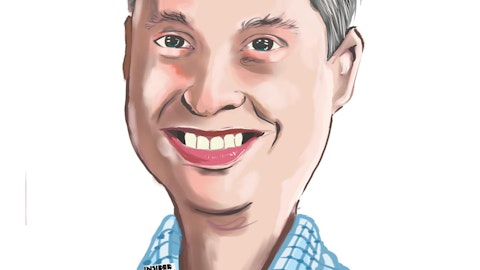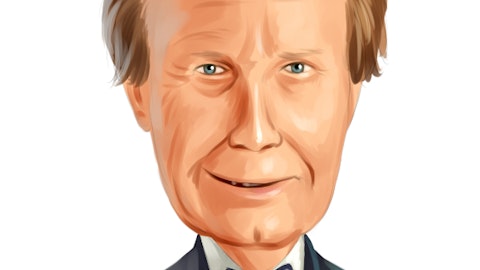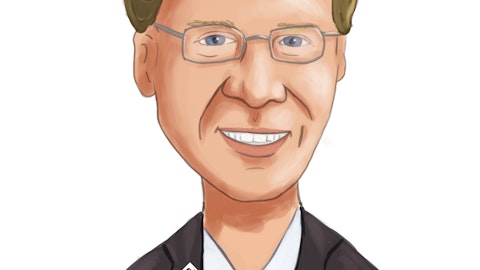Sergio Passos: We do believe that well, the — our main business is in Brazil, and we believe that after the elections where we saw some upsides on the foreign exchange, that would actually let’s say, make 2023. As the new government comes in, inflation again, is another topic that I believe is very important. In the case of Brazil, the Central Bank raised it very early, our interest rates, which as you are well aware, there’s a lot in the hedge because that is a direct impact to us. But in another side, it makes inflation much more under control. So the government now expects that inflation for this year compared to the 10.3 that we had last year, would be around 5. In that sense, we believe that foreign exchange should be better than it was actually in 2022.
So in a way, maybe foreign exchange can be kind of a tailwind rather headwind for us mainly in the Brazilian portion of the business. Looking at Euros, it’s hard, but — it’s hard to predict. But again, we had a headwind narrow in the last quarter, which is now more stable. So we believe that foreign exchange should not be a huge impact. I mean, a huge headwind for us for next few year, I think that it could be actually a slight tailwind.
Vincent Colicchio: So a conservative estimate would be no impact year over year, I suppose.
Sergio Passos: Yes.
Vincent Colicchio: And then, do you have — the contract value of sales growth in the quarter was nice to see the 10%, I think it was. Do you have a number for the nine months compared to the prior year nine months?
Sergio Passos: I don’t know if I have it here, but definitely we can get it to you.
Hernan van Waveren: We have another question from our audience. What are the expectations of your cash and free cash flow for the end of the year?
Carlos López-AbadÃa: For you, Sergio.
Sergio Passos: We are — as I mentioned, Q4 is a very, very solid quarter for us. So we expect first, EBITDA to grow compared to the same pace that we had Q2 to Q3 from Q3 to Q4. So that’s one side of that. Working capital is significantly positive in our Q4. Remember that in Q1, I explained that we had some advances that we received in Q4, which hits negatively Q1, but it is positive in Q4 on top of the same control in terms of CapEx. So overall, we expect a free cash flow in Q4 to be in the range of $40 million Free cash flow and operating cash flow, because in a way, the difference on the interest is very small compared to what we had, the $46 million this quarter. So we believe that our free cash flow should be in the range of $40 million, and that would make our cash balance in this range between $90 million and $100 million.
Operator: Thank you. And our next question today comes from Beltran Palazuelo with DLTV.
Beltran Palazuelo: First of all, it’s a little bit confusing if I get the number. I think you alluded, Carlos, in your prepared remarks that you expect strong third quarter in terms of margins, I think, if I’m not wrong, between 14% and 15%. And then Sergio more conservatively said it was 13% to 14%. So the first question maybe is what do you expect on margin?
Carlos López-AbadÃa: I noticed that myself, and normally I’d say, well, I’m sure I screwed up because the numbers — Sergio knows them better. But I think I recall that to be on this slide. So that’s probably the one that you should use.
Sergio Passos : Yes. We are expecting the range of 14% to 15%.
Carlos López-AbadÃa: So I don’t know who was trying to be more conservative, or it’s just as important. So that’s correct.
Beltran Palazuelo : Thank you very much. It’s better to be conservative than to lead with those margins and with the free cash flow generation that Sergio was commenting yearly, let’s say, net debt to EBITDA guidance is also conservative. Let’s get to questions if I may. In 2023, if you could give us, let’s say a little — I know it’s difficult, you do know where our volumes , you do know the sales. But let’s see, what do you know — what do — are you budgeting for next year in terms of let’s say constant currency growth. And then a little grasp with these new contracts like the Philippines supposedly that the margins and free cash flow is more or less of course, everything can change for this.




